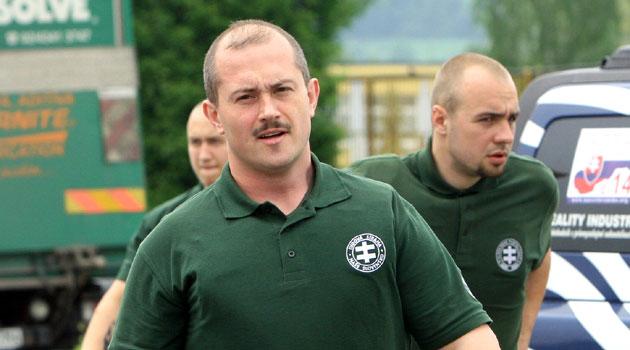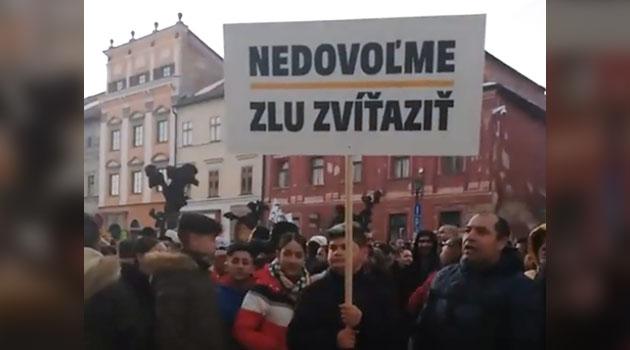Slovak fascist party second-strongest in polls, yet another protest forces its rally to relocate

In a crowded cultural center in the smaller district town of Bytča in northwest Slovakia, the extreme right-wing “Kotlebites-People’s Party Our Slovakia” (LSNS) criticized the European Union, liberals, and standard political parties on the afternoon of 23 January while opponents of extremism arrived in front of the building carrying signs with anti-fascist slogans. This was another LSNS meeting before the February parliamentary elections during which the critics of the extreme right gathered at an event organized by the party.
Because of such protests, LSNS had previously prematurely canceled another rally and eventually changed the venue of the meeting in Bytča. According to opinion polls, LSNS, chaired by a former Governor of the Banská Bystrica Region, Marian Kotleba, is the second most popular party in Slovakia and support for it is growing.
The party has long defined itself as against NATO, the EU and the Roma, and in the ongoing campaign has also bet on slogans calling for establishing “order” in the country and combating “liberalism”. “Anti-socials who refuse to work will not get anything. There is no other way,” was the message that MEP Milan Uhrík (LSNS) had for Romani inhabitants of the country’s settlements in his speech.
The crowd of approximately 400, who occupied not just the chairs in the hall of the cultural center in Bytča, but many of whom also stood in the corridors of the building to hear the party’s message, responded with strong applause to that statement. According to Uhrík, the members of what he called the “majority population” in the EU are currently “second-class citizens” and benefits are being enjoyed by ethnic and sexual minorities or immigrants.
“The EU aims to replace the indigenous nations with a mix from foreign countries,” he alleged. According to him, the “liberals” are pushing for privatization, the relaxation of laws governing the consumption of drugs, and the establishment of flexible working hours.
“We want a Christian Slovakia, we reject the Islamization of Slovakia,” Uhrik said. The party also promises free health care, the construction of state-owned flats, and reduced VAT.
The LSNS newspaper also carried the allegation that former Czechoslovak President and “sweetheart of the West” Václav Havel had sold out Slovakia and bears the greatest responsibility for the increase in crime and unemployment there after the fall of communism in 1989. The article featured a photograph of Havel with a cigarette in one hand and a glass of alcohol in the other hand, along with the caption “The drunken Vašek – the idol of liberals and liquidator of Slovak industry”.
According to the LSNS, Havel is one of the greatest role models for some Slovak liberals. In Bytča, the party had originally announced a rally on the square where dozens of their opponents also assembled that afternoon.
The anti-LSNS demonstrators then moved on to the cultural center where the LSNS event finally took place. Some carried signs reading “Stop fascism” or “Christianity is love, not hatred.”
Among them were representatives of a coalition of non-parliamentary parties, Progressive Slovakia / Spolu (Together), which belongs among the top four most popular political formations in Slovakia and which also convenes counter-events at the locations of LSNS rallies. The LSNS is the only parliamentary party in Slovakia to openly espouse the wartime Slovak State, which was associated with Nazi Germany.
The President of the then-Slovak Republic, Jozef Tiso, who was sentenced to death after the war, was born in Bytča. The LSNS election rally there was not the first place their critics demonstrated against them, though.
For example, on 21 January the party canceled a rally in the eastern town of Levoča once it became clear that the crowd of LSNS opponents present was significantly larger than the number of sympathizers assembled. LSNS alleged that “liberals” had begun to bring “anti-socials and criminals” to their election rallies, but the police said that claim was incorrect.
The LSNS was responsible for the biggest surprise in the parliamentary elections four years ago when they won eight percent of the vote, which meant 14 seats in the 150-member unicameral legislature. In recent polls LSNS support has reached double digits.
Parliamentary elections in Slovakia will be held on 29 February. The long-term most popular party in the country is the government’s Směr-sociální demokracie (Direction – Social Democracy), but its approval rating has been declining in recent years and is now around 18 percent.
